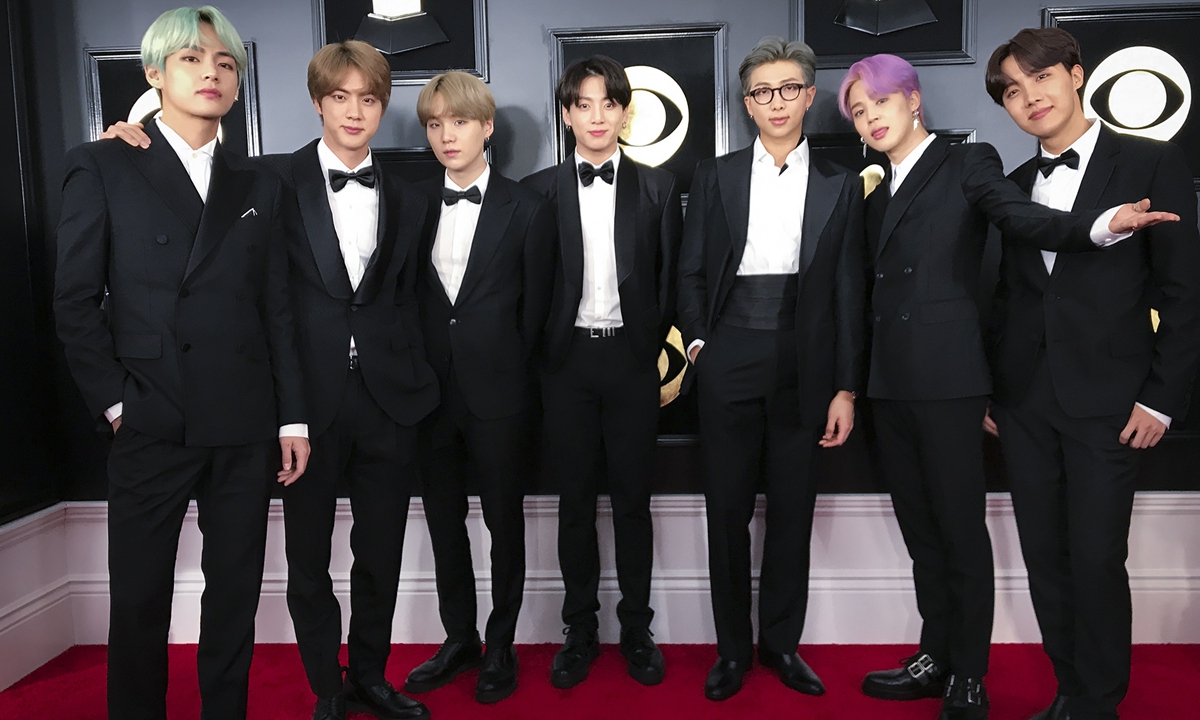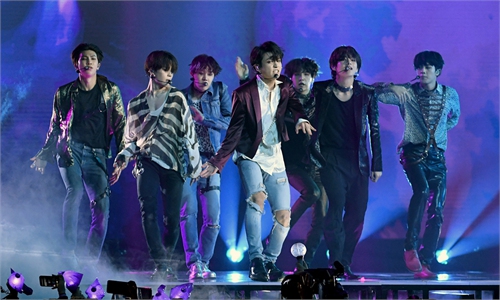
BTS Photo: CMS
Major Chinese social media platform Sina Weibo on Sunday night continued its rectification of Chinese fan groups following South Korean entertainers by blocking 21 fan accounts from posting for 30 days, 12 hours after it muted a fan account for a popular South Korean band BTS member for 60 days due to illegal fundraising.
"Seasoned idol chasers" reached by the Global Times saw South Korea as the origin of the current Chinese mainland idol-chasing culture, and believed they should not and will not be exempt from recent rectification actions which aim to cleanse the capital chain and bring the youth back to rational consumption.
The 21 accounts punished by Weibo involved fans of Lisa and Rose, two members of the girl band Blackpink, Rap Monster, another BTS member, and fans of pop band EXO of which Kris Wu, a suspected rapist of female fans, was a former member.
Weibo said the fan accounts spread irrational idol-chasing content and misled followers. "Weibo ramps up efforts to rectify the 'fan circle' without differentiation of time or location," the platform announced.
Some net users interpreted the information as a sign that fan groups of foreign entertainers, mostly South Koreans, will be targets of rectification efforts.
The BTS account, in coordination with fan groups on other platforms, began raising money in April to prepare for the birthday celebrations of band member Park Ji-min in October, including a customized airplane from Jeju Air. Over 1 million yuan ($150,000) was collected in three minutes and 2.3 million yuan in one hour, Park's fan club revealed.
Chinese fans pay the South Korean airline to have customized airplane coating, cabin decorations and boarding passes. But grassroots fans have no say in bargaining for prices with the airline or questioning transparency of the spending, a former BTS fan told the Global Times on condition of anonymity, noting she has always been suspicious of whether the fan club leaders will keep brokerage.
South Korean agencies do not have financial ties as close as Chinese firms with fan circle leaders, but they still rely on Chinese fan groups to sell more albums, idol-themed souvenirs and idol-endorsed products. Indirect income includes popularity-based commercial contracts and the South Korean government can benefit through tourism.
BTS' single "Dynamite" in 2020 generated more than $1.4 billion for the South Korean economy and thousands of new jobs in the country, AFP reported, citing a government study.
Before the chill on South Korean entertainers in 2016, fan circle leaders also flew with South Korean idols and followed idols' activities on the mainland. Fan leaders took photos of the idol and sold photo books, usually overpriced, to fans who have no time or money to follow all those activities, the Global Times learned from fans of K-pop bands.
Chinese and South Korean fans also compete on who collected more for their "oppa" (used in Korean culture by a female to a male, who is older than her) and fan group leaders have various ways to incite fans to spend more in fundraising for albums, fashion magazines and birthday celebrations, the anonymous BTS fan said. "Do you want to lose to South Korean girls?" or "The more you spend, the more frequent our idols come to China."
After the Chinese cyberspace regulator enhanced measures to tackle sick "fan circle" culture, there have been discussions on how it will impact the entertainment industry in South Korea as well as Japan and Thailand, whose stars and agencies earn big from Chinese fans.
The muting of the BTS fans account was immediately covered by major South Korean media like SBS and Yonhap. The Korea Times reported Monday that the Chinese regulation will affect the K-pop industry, because China is the top source of revenue for South Korea's leading entertainment agencies.
According to the news report, K-pop album sales in July surged 3.6 times to $26 million, and $8.25 million came from China.
Chinese music platforms have banned repeated purchases of e-albums amid the latest rectification of fundraising and irrational consumption, which industry observers predicted would affect South Korean entertainment firms' revenue.
Three major South Korean firms, YG, SM and JYP Entertainment, saw their stock prices slide by 2.54 percent, 1.94 percent and 1.57 percent, respectively, after China's National Radio and Television Administration (NRTA) announced a ban on idol-picking programs, the Korea Times reported.
Various Chinese video platforms have bought or copied such programs from South Korea and earned well. The idol market in China will reportedly be valued at about $21.6 billion in 2022.
Zhu Yannan, an official of the NRTA, said recently at a forum that the targets of China's rectification campaign are brokers, entertainment agencies and platforms, as well as capital.
Foreign firms earning money from Chinese fans through a problematic model will not be exempt from tightened regulations, experts noted.
Fan circles of South Korean idols run very similar to those of Chinese entertainers, or the Chinese fan circle culture evolved from Chinese fans of South Korean idols, idol chasers said.
The K-pop heat became noticeable in China in the 2000s when bands like TVXQ attracted a huge Chinese following who found the pop idols different from pure singers or actors. That was also the time when idol-picking variety shows based on public votes became popular.
Since then, Chinese youth gradually got accustomed to fundraising for albums, chart hitting, and pricey birthday celebrations.
Wang Tong, a former TVXQ fan in her late 20s, told the Global Times that idol-chasing was the highlight of her busy high school years but "I knew it went completely wrong when I saw young fans saving breakfast money to buy albums on fan groups."
"Isn't that crazy to starve for a foreign idol that you have only seen on the screen?" Wang asked.

